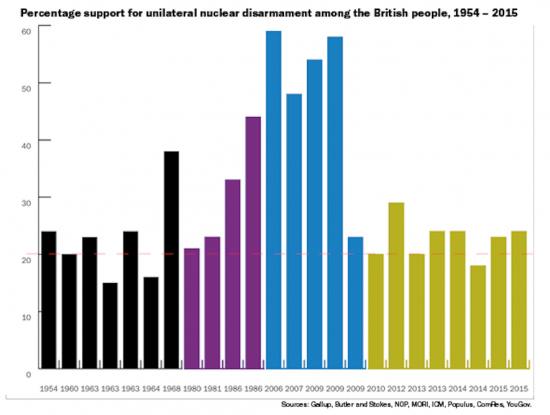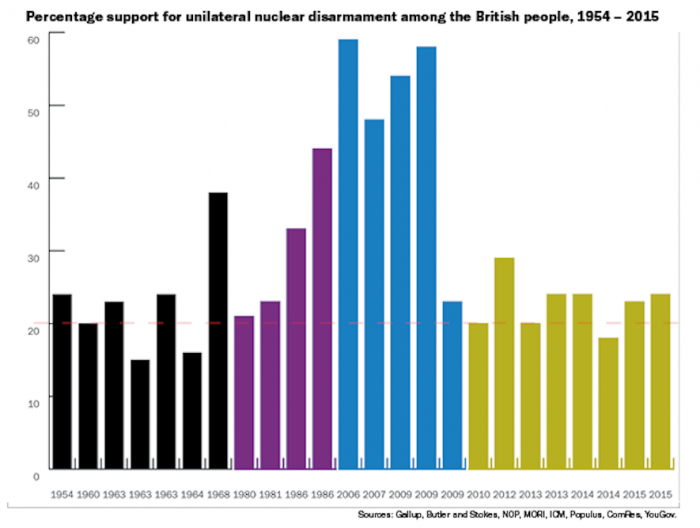
Below is a list of the UK public opinion polls used to draw up the chart on p17 of PN 2661, reproduced below. This chart showed that, consulting 24 polls during the period 1954 – 2015, only three showed public support for unilateral nuclear disarmament dipping – briefly – below 20 percent (1963: 15 percent / 1964: 16 percent / 2014: 18 percent). The other 21 polls showed much stronger support for British unilateral nuclear disarmament, ranging from 20 percent to 59 percent, depending on how the question was put.

1954 – 1986
For this period, all the poll results used in the chart are taken from one academic article on the subject of public attitudes to nuclear weapons – details below.
1954: ‘we should not use atomic weapons in any circumstance’ – 24 percent agreed – Gallup, May 1954
1960: UK should ‘Give up nuclear weapons entirely’ – 20 percent agreed – Gallup, April 1960
1963: UK should ‘Give up nuclear weapons entirely’ – 23 percent agreed – Gallup, May 1963
1963: ‘Britain should have nothing to do with nuclear weapons under any circumstances’ – 15 percent agreed – Butler & Stokes, August 1963
1963: Britain should give up independent nuclear deterrent – 24 percent agreed – NOP, July 1963
1964: Britain should give up independent nuclear deterrent – 16 percent agreed – NOP, July 1964
1968: agree with people who want Britain to give up nuclear weapons – 38 percent – Gallup, June 1968
1980: it’s a ‘good idea’ to give up nuclear weapons ‘whatever other countries decide’ – 21 percent agreed – Gallup, September 1980
1981: get rid of nuclear weapons ‘even if other countries keep theirs’ – 23 percent agreed – MORI, October 1981
1986: it’s a good idea that the UK ‘should give up relying on nuclear weapons for defence whatever other countries decide’ – 33 percent agreed – Gallup, August 1986
1986: UK ‘should give up relying on nuclear weapons for defence whatever other countries decide’ – 44 percent agreed – Gallup, September 1986
All the above poll results are taken from Hugh Berrington, ‘British Public Opinion and Nuclear Weapons’, in Catherine Marsh & Colin Fraser, eds, Public Opinion and Nuclear Weapons (Macmillan, 1989).
2006 – 2015
2006: ‘The total cost of replacing “Trident” missiles, submarines and base facilities is likely to be around £25 billion. This is the equivalent of building around 1,000 new schools at current prices. On balance, do you think the UK should replace its nuclear weapons, or not?’ – 59 percent said ‘No’ – ICM, July 2006 (poll carried out for CND)
2007: Given various options, a total of 48 percent of people chose two options that meant Britain should get rid of its nuclear weapons. Option 1: ‘During the Cold War it was important for Britain to have nuclear weapons, but times have changed and we should get rid of them now’ – 19 percent agreed. Option 2: ‘Britain does not need nuclear weapons now and should never had had them in the first place’ – 29 percent agreed – Populus, February 2007 (poll carried out for More 4 News)
2009: ‘You may have seen or heard that the government is considering plans to replace Britain’s nuclear weapons system, Trident, which is coming to the end of its operational life. Do you think Britain should replace the nuclear weapons system with a new one or should it no longer have any nuclear deterrent?’ – 54 percent chose ‘should no longer have a nuclear deterrent’ – ICM, July 2009 (poll for the Guardian)
2009: ‘Given the state of the country’s finances, the government should scrap the Trident nuclear missile system’ – 58 percent agreed – ComRes, September 2009 (poll for the Independent)
2009: ‘Which of the following policies would you favour most regarding the replacement of Britain's Trident nuclear missile system when it reaches the end of its useful life?’ – 23 percent chose ‘Britain should give up nuclear weapons completely’ – YouGov, September 2009 (poll for Left Foot Forward)
2010: ‘As you may know, the UK’s independent nuclear deterrent is approaching the end of its operational life. Current policy is to replace the Trident submarines with a new fleet of boats, and to replace the ballistic nuclear missiles they carry at a later date. Which of the following options would you favour most?’ – 20 percent chose ‘Not renew the deterrent and give up nuclear weapons altogether’ – YouGov, July 2010 (poll for Chatham House)
2012: Given various options, a total of 29 percent of people chose unilateral nuclear disarmament for Britain, either immediately or over a period of years, regardless of the international situation. Option 1: ‘Disarm all of its weapons immediately, regardless of the international situation – 18 percent agreed. Option 2: ‘Disarm gradually, over a period of years, regardless of the international situation’ – 11 percent agreed – MORI, November 2012 (poll for the UNA)
2013: ‘The United Kingdom should give up nuclear weapons altogether’ – 20 percent agreed – YouGov, April 2013 (poll for the House of Commons public administration select committee)
2013: ‘Britain should give up nuclear weapons completely’ – 24 percent agreed – YouGov, July 2013 (poll for the Sunday Times)
2014: ‘The UK nuclear weapon system should be disbanded and disarmament should take place’ – 24 percent agreed – ComRes, February 2014 (poll for WMD Awareness Campaign)
2014: ‘If Scotland were to become independent, do you think the remainder of the UK should...’ – 18 percent chose ‘Get rid of its nuclear weapon system completely’ – YouGov, August 2014 (poll for the Sunday Times)
2015: ‘If Scotland were to become independent, do you think the remainder of the UK should...’ – 23 percent chose ‘Get rid of its nuclear weapon system completely’ – YouGov, January 2015 (poll for The Times)
2015: ‘Britain should give up nuclear weapons completely’ – 24 percent agreed –YouGov, March 2015 (poll for the Sunday Times)

